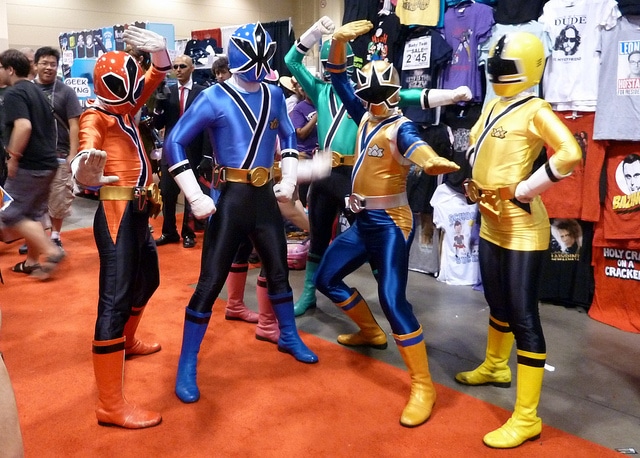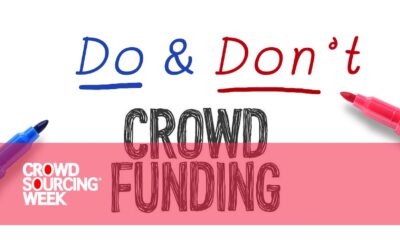Last month, the British anti-poverty organization, Oxfam International released a report on the state of the world’s resources, saying that the “richest 1% will own more than all the rest by 2016.” With such ominous prediction seen on the headlines, which coincided with the depressing annual Blue Monday, an unrelated geeky news could perhaps help brighten the day—the original cast of the 90’s popular TV show, Mighty Morphin Power Rangers finally reunited for the first time ever. But how’s it related to crowdfunding, anyway?
We can draw an inspiration from this group of five ordinary teenagers. Zordon directs Alpha 5 to recruit them to fight against alien invasions led by the meanest villain, the popular antagonist, Rita Repulsa. And we all know the story. Each of them is given a power, a dino-monster dubbed “Zord,” allowing them to morph. In full force they can combine the “Zords” when in big trouble and subsequently morph into a “Megazord.” United they become stronger. As always, the story ends with the Power Rangers conquering the monstrous reptilians and saving the world.
Dino-monster Zords, villains, and crowdfunding
Each of us are given the ability to produce wealth, but sadly there’s an unequal distribution of resources that, as I craft this article now, more than a billion people are barely living on. Specifically, it’s less than $1.25 per day according to Oxfam, while one member or adult of the global rich 1% enjoys an average wealth of $2.7 million (in 2014).
As Bloomberg puts it, “The 1 percent is literally rich beyond measure, depriving nations of billions in tax revenue and obscuring shifts in global inequality.” This is perhaps an analogy of the villains and antagonists in the MMRP story. This reality is shocking, yet we can view this occurrence from a different vantage point amidst the wide gap between the wealthiest and poorest. Through the lens of crowd finance. The practice of acquiring monetary contributions via Internet can disrupt the banking and finance systems, though there are still challenges in terms of regulations and legislations across the globe that dumb down the process.
Legendary investor Mark Andreessen, backer of Uber, AirBnB and Twitter, takes us to the nooks and crannies in his interview with The Motley Fool of what the old system does. “The problem with building a new product or service in the existing financial industry is that tens of thousands of pages of legislation and thousands of lobbyists are going to come down on you very quickly.”
Morphin’ time with the Zords – Successful crowdfunding campaigns and new systems
- The fintech explosion – in exchange of better, more efficient, and cheaper solutions
Notable startup brands today, raking billions in IPO and disrupting the status quo, are mostly birthed from crowd participation. AirBnB could be hitting $13 billion valuation as reported in Q4 last year as well as Uber at its $41 billion mark. Not to mention the highest funded projects, ranging from product design category like Coolest Cooler (exceeded its $50,000 mark to $13,285,226) to smartwatch Pebble (acquired $10,266,845) to real estate like WEISSENHAUS (collected €6,325,700) and the ongoing campaign of the Star Citizen video game on Kickstarter, which is already up at $69,468,933, exceeding its $500,000 target as of press time. The fintech industry is attracting global investors and according to The Wall Street Journal (TWSJ), it has tripled during the past five years and according to Constellation Research, 52% of Fortune 500 companies were affected by digital disruption, either gone or bankrupt since 2000. Lastly, The Financial News listed the 40 innovators shaping the finance sector — all an indication of opportunities to the level the economic playing field.
- The banking system – decentralization
Launching products and services may be an easy climb for others, but to enter in banking and finance sectors, where policies and regulations remain as barriers, it’s a different and arduous experience. Simple, a startup company in 2009, learned it the hard way after Bancorp Bank acquired its BankSimple and subsequently sold to a giant European banking group last year. However, Bitcoin has made its move in undercutting the system through peer-to-peer network that decentralizes payment transactions in a fly. No banks, no fees or lower fees for that matter, and transactions are done in ways where people don’t have to disclose their information. On the other hand, OurCrowd, an Israeli based equity-crowdfunding adopts hybrid platform to benefit angel and accredited investors and startups.
- New systems in finance – for speed, agility, and scalability
Meanwhile, other fintech startups are leveraging on the surplus of data we have today in speeding up loan processing. Kreditech, a German-based company uses Facebook and other social media profiles to evaluate the borrowers’ credit score for their loan business. Big Data Scoring, an Estonia-based data science company, helps lenders in the process through analysis of the borrowers’ history and social media activities and also extracts data from the borrower’s Amazon and eBay accounts. On the other side of the world, Roostify, a San Francisco-based startup, provides us an efficient way in “accelerating and simplifying mortgages.” A borrower simply uploads the necessary financial documents on a secured data room in the software, which are available for viewing to loan officers and lenders and speeds up the process.
Morphin’ for better causes
According to Oxfam, 20% of the billionaires have invested in financial and insurance sectors; other listed billionaires are throwing their money off to healthcare and pharmaceutical sectors, which increased their collective net worth by 47% and in 2013 they shelled out more than $500 million, lobbying policy makers in Washington and Brussels. However, Boston-based network Responsible Wealth, which caters to business leaders and wealthy people in the U.S., is rallying economic fairness through its platform and “challenges the concentration of wealth and power that corrupts democracy, deepens the racial divide and tears communities apart.”
Given the above-mentioned probabilities and successful campaigns through crowdfunding, the new systems being adopted in various sectors (e.g. affiliated merchants allowing users to pay Bitcoins), and the progressive increase of the fintech’s value, to equalize distribution of the wealth could be in the not-so-distant future. Crowdfunding is still a risky activity and there’s a need to educate people about the challenges, risks, benefits, and perks for better, valuable, and meaningful experiences to “MORPH” everyone’s lives. As the saying goes, “Two is a crowd.” The Mighty Morphin’ Power Rangers are five, and we—the crowd—are billions, and for sure we can achieve more.




0 Comments